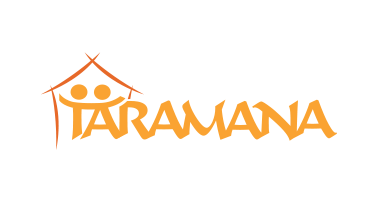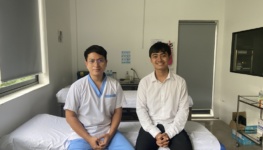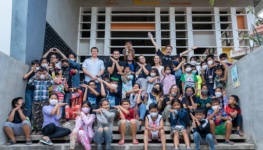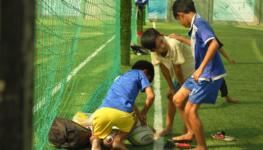The health situation in Cambodia is deteriorating significantly. And this, since the discovery on February 20th of a cluster in the heart of the capital Phnom Penh: the number of positive cases to the Covid-19 is increasing daily, the whole territory is now affected by this new wave and the authorities describe the situation as “the largest community transmission since the beginning of the pandemic”.
A tense context confirmed by the statistics: since the appearance of the new outbreak, in less than a month, the total number of positive cases has almost tripled, from 516 to 1,430 cases. To make matters worse, the very first death linked to Covid-19 in Cambodia was reported on March 11.
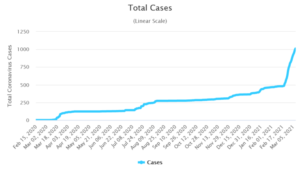 Total Covid-19 positive cases in Cambodia between February 15, 2020 and March 8, 2021. Source: Johns Hopkins University.
Total Covid-19 positive cases in Cambodia between February 15, 2020 and March 8, 2021. Source: Johns Hopkins University.
For Visal DOEU, a nurse requisitioned by the Ministry of Health to fight on the front lines against Covid and a member of the Taramana team, the phenomenon of community transmission is “the worst scenario that could have happened. “I’m worried for my family and my health,” he continues, “because the cases are increasing every day, the population is starting to get tired of it, to pay less attention and not be afraid of the virus anymore.”
EMERGENCY AND PRECAUTIONS
As for the country’s authorities, they do not relax. On the contrary. As soon as the February 20 cluster was discovered, restriction measures were tightened. The closure of schools and universities in the provinces of Phnom Penh, Kandal and Sihanoukville, cinemas and sports halls, theaters and museums in Phnom Penh and Kandal province were announced. A QR code system has also been set up in establishments receiving the public.
And it doesn’t get any better. In a “special” audio message broadcast in an “emergency” on Monday, March 8, Prime Minister Hun Sen announced a ban on all gatherings, including in businesses. Teleworking was now the norm for a minimum of seven days. “The current situation requires even more vigilance than before and what is not necessary must be suspended and postponed. This is an urgent situation and precautions must be taken to stop the spread of the virus,” said the head of the Cambodian government. Wearing a mask has also become mandatory since March 12, under penalty of a fine, whereas until then it was only recommended.
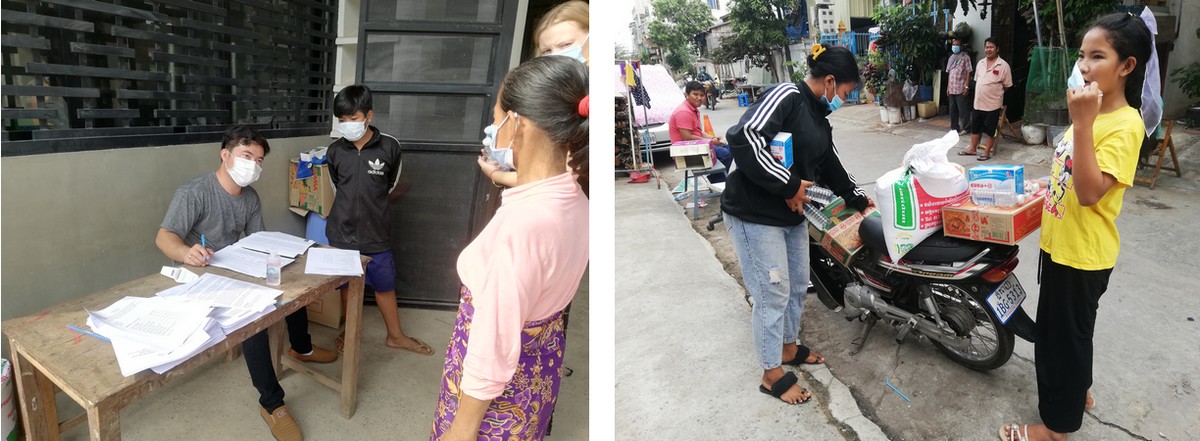
TARAMANA IN SLOW MOTION
This resurgence of the epidemic has even reached the slum of Boeng Salang, where Taramana intervenes with disadvantaged families, where a woman has been declared positive. This situation obviously affects the organization of Taramana. The Taramana Magdalena Center no longer welcomes any groups of children, extracurricular activities such as rugby and dance have been suspended and the staff members are mainly teleworking.
Taramana is slowing down but, fortunately, its solidarity activities are not interrupted. Rice distributions continue and are even the rare times when children are allowed to come to the Center. A distribution of a box of 50 masks and a liter of hydroalcoholic gel to each family followed by Taramana also took place this month. On the health side, the association still regularly provides medicines to the inhabitants suffering from chronic diseases. Moreover, Dr. Jocelyn Dordé, Taramana’s president, Visal, our nurse, as well as Dararith, our social worker, remain at the disposal of the families in case of emergency or particular request.
The only good news is that approximately 300,000 doses of vaccine arrived in Cambodia in early March and vaccinations have begun. Health professionals are the first to benefit. Let’s hope that the situation improves in the weeks and months to come!


